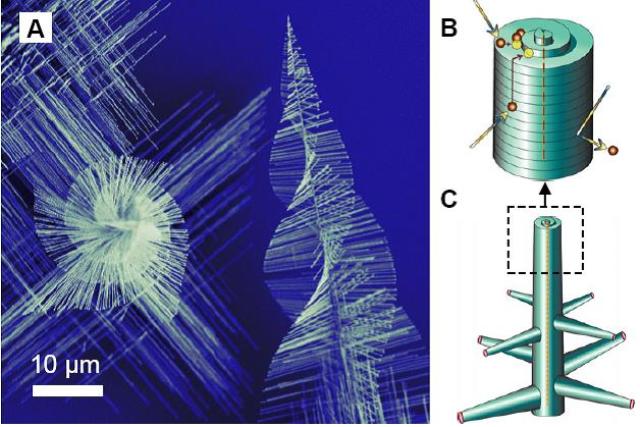Mar 9 2015
Song Jin of the University of Wisconsin-Madison will lead a seminar on dislocation-driven nanomaterial growth and its application in solar energy conversion using Earth-abundant nanomaterials at 3:30 p.m. Monday, March 9, in CHEM 144.
 "Christmas Tree" nanostructures demonstrating Eshelby twist.
"Christmas Tree" nanostructures demonstrating Eshelby twist.
The presentation will begin with a discussion of a nanowire formation mechanism that is different from the well-known vapor-liquid-solid (VLS) growth, in which axial screw dislocations provide the self-perpetuating steps to enable 1-dimensional (1D) crystal growth. This mechanism was initially found in hierarchical nanowire structures with helically rotating branches resembling "pine trees." Dislocations can further result in the spontaneous formation of nanotubes, 2D plates, and other morphologies. Many recently established new examples show that dislocation-driven growth is general to many materials grown in vapor or solution phase. The Jin lab has used classical crystal growth theory to guide the rational design of dislocation-driven nanowire growth.These discoveries can create a new dimension in the rational design and synthesis of nanomaterials.
Further discussion will cover how these discoveries will enable the scalable and low-cost synthesis of earth-abundant nanomaterials for large scale renewable energy applications, such as in solar and thermoelectric energy conversion, and nanostructured battery electrodes. This will be illustrated by the growth of 1D nanomaterials of earth-abundant and inexpensive semiconductors, such as hematite (a-Fe2O3), pyrite (FeS2), and cuprous oxide (Cu2O). The photoelectrochemical investigations of these nanomaterials and various doping and nanostructuring strategies using 3D hierarchical nanocomposites or branching nanostructures are investigated to overcome the conflicting requirements by light harvesting and carrier collection.
Jin is a professor of chemistry at the University of Wisconsin-Madison. He received his B.S. in chemistry from Peking University in 1997, his doctorate in 2002 from Cornell University under the direction of Francis J. DiSalvo and carried out his postdoctoral research under the direction of Charles M. Lieber at Harvard University.
Jin is interested in the chemistry and physics of nanoscale materials and solid state materials and their applications, especially in renewable energy. He developed innovative synthesis of a variety of nanomaterials including metal silicides, oxides and chalcogenides, and developed fundamental understanding of screw dislocation-driven growth of nanomaterials in the context of crystal growth theory. Building on the understanding of novel physical properties, Jin advances the interdisciplinary exploitation of (nano)materials for photovoltaic and photoelectrochemical solar energy conversion, thermoelectric energy conversion, energy storage, nanospintronics, and biotechnology.
The unifying theme of Jin's energy research is the focus on earth-abundant materials. Jin has authored or co-authored four patents and 101 publications. He has been recognized with an NSF CAREER Award, a Research Corporation Cottrell Scholar Award and as one of world's top 35 innovators under the age of 35 (TR35 Award) by the MIT Technology Review Magazine, the ACS ExxonMobil Solid State Chemistry Fellowship, and the Alfred P. Sloan Research Fellowship, Research Corporation SciaLog Award for Solar Energy Conversion, and U. of Wisconsin-Madison Vilas Associate Award and H. I. Romnes Faculty Fellowship. Most recently he received the ACS Inorganic Nanoscience Award.